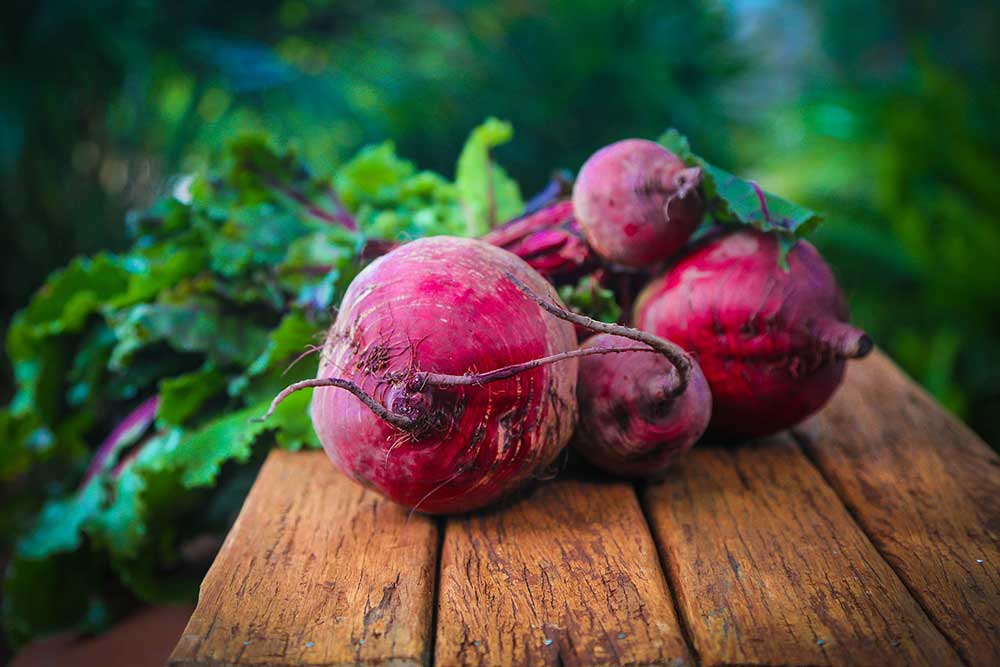
Ahhh the lowly beet. It’s not really a food source most people consider when they think of staple foods. I rarely ate them when I was competing. Not because I didn’t like them, I do. I just - - didn’t. If I saw pickled beets on a salad bar, I would toss a few on my plate. And I used to like pickled beets with cottage cheese. I can still see the pink color everything turned.
Boy do I wish I’d known then what I know now. Being winded would have never been a limiting factor in my game. Hence athletes today use beets for “legal blood doping.”
But even if you aren’t an athlete, beets can do amazing things for your blood flow and reduce the oxygen cost of your cells (meaning they can do the same work with less oxygen). All of that means being less winded, even during daily tasks AND it means more oxygen to your brain. Wait, what? Yes. Eating beets can improve brain function too.
How beets work in the body
The nitrates in beets boost your body’s ability to produce nitric oxide. Nitric oxide, in turn allows your blood vessels to dilate properly and move more blood more quickly when it is needed.
This improves both physical and mental performance, separately and when needed together. It is interesting to note that these changes aren’t just in-the-moment. There is also improved neuroplasticity. Meaning older adults can make new connections in the brain similar to younger brains.
Beets and blood pressure
Another added bonus – eating beets or drinking beet juice naturally lowers blood pressure. Makes sense. If your blood vessels are more flexible your heart doesn’t have to work as hard to push the blood through them.
In my personal experience, when I eat beets regularly my top blood pressure number drops about 15 points and the bottom number about 7. Of course, that is the antidotal. But the science does support beets lowering blood pressure.
Beets and less sweating?
An additional observation on my part (no science on this one), eating beets seems to allow the body to cool itself better.
Hear me out on this.
Expanded blood vessels release more heat (hence your blood vessels constrict and your blood pressure goes up when you're cold).
It's not directly tied to sweating in the science and since sweat is related to heat dissipation not blood flow, I can't claim causation. However, there does seem to be a correlation.
So, if sweating and being too warm are reasons you don’t want to exercise – beets to the rescue.
Beets and blood medications
One word of caution I should add - if you are on blood thinners or blood pressure medication, be aware that healing your endothelial layer (the cells doing the work to make your blood vessels more flexible) by eating beets (and/or eliminating animal products) will lower your blood pressure and may reduce your need for the drugs. Continuing to take the drugs at the same level while also eating beets on a regular basis can cause lightheadedness or dizziness. If you experience this symptom, see your doctor about lowering your dosage. Do not change your medication intake without proper medical guidance.
How to eat beets
It seems there is no wrong way to add beets to your diet. We choose to eat them raw on salads, mostly because I’m too lazy to do anything else with them. I also like to drink beet juice. Russ is not really a fan.
The science seems to indicate that baked and pickled are just as good. We have a client who hates beets so he uses concentrated beet juice shots. He says they are still awful tasting, but at least it’s over quickly.
There is even such a thing as beet chips. Now I’m guessing they are made with oil and have added salt. I wouldn’t say they are a health food. If there is a “wrong” way to include beets in your diet, chip form might be it.
A word of awareness
The red color in beets does not get digested and it will show up in the toilet. Your urine may turn the color of apple juice, even if you are well hydrated. And you will see what looks like blood in your solid waste. Don’t worry. You didn’t suddenly start bleeding internally. That is just a side effect of eating beets.
Join the WFM Club to get access to the entire Whole Food Muscle Framework – Food (what), Fasting (when), Fitness (how) and the differentiator of having the Psychology (why other programs haven’t worked for you).
Dr Robyn is a former competitive volleyball player turned psychologist with continuing education in nutrition. Russ is a former competitive bodybuilder and trainer on the Mr. Olympia Tour. They are the co-founders of Whole Food Muscle and the authors of How to Feed a Human The Whole Food Muscle Way. To work with them one on one to improve your health and fitness or to have them speak at your event or organization email them at Health@RnRJourney.com.


